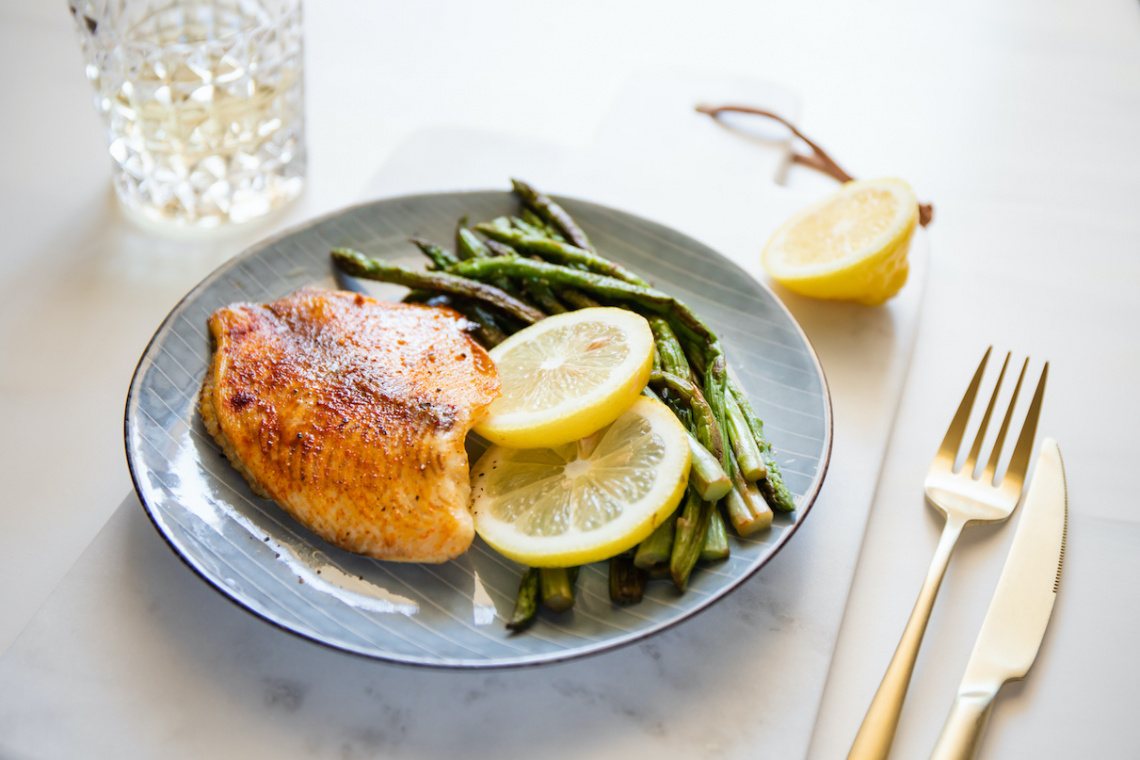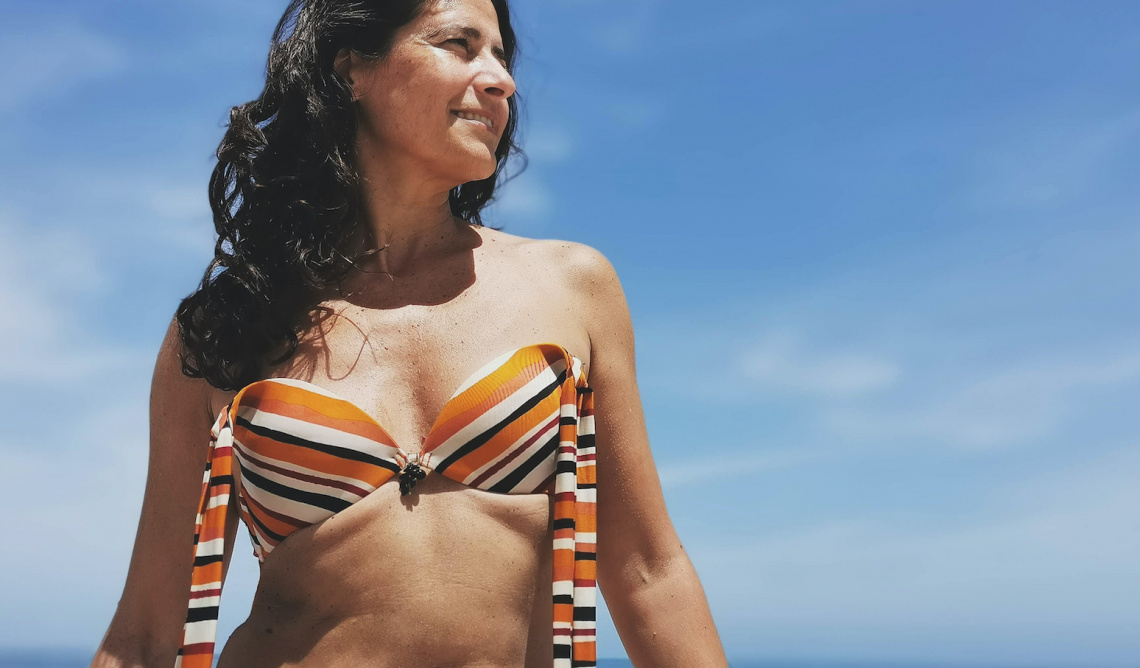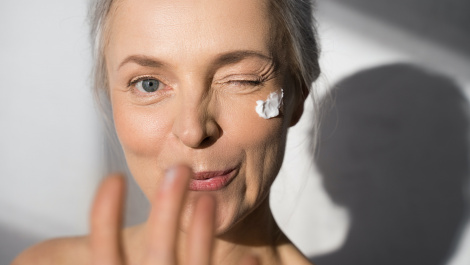Behold the muffin top!
How does it even happen? One minute you’re springing around in a bikini thong and a string vest – the next, you squeezing into ‘body-sculpting’ underwear and staring at the scale in bewilderment and horror. Coupled with the fact that the zip in the eye-wateringly expensive designer pants you bought only weeks ago simply doesn’t fasten anymore – and the snide comment from your sister-in-law about a ‘fabulous new way to count kilojoules’ that she thinks you should try – chances are you aren’t going to be thrilled with the sudden awareness of your growing girth.
As clinical dietician Ilsabé Spoelsta explains, when you were younger and gained a bit of weight, it probably settled on your hips and thighs, a pattern known as gynoid fat distribution. ‘However, during the dreaded ‘change’ (perimenopause and after menopause), unavoidable hormone changes make it more likely that you start collecting extra padding around your middle, a pattern called android fat distribution.’
The fat in this area, called visceral fat, isn’t the subcutaneous (under the skin) fat you feel when you poke your stomach. It’s actually found deeper in the abdomen, filling the space between the vital organs and the fat-covered membrane that lines your abdominal cavity.
4 Reasons you might be packing on the pounds
- Your hormones are out of whack. Some forms of oestrogen (such as oestradiol) are linked with how your body controls weight gain. When oestradiol levels plummet during menopause, it stands to reason this could lead to weight gain. One study showed that in the time between perimenopause and post-menopause, most of the women observed gained belly fat and lost muscle. This was due to a fluctuation of hormones that led to an increase in appetites (oestrogen progesterone and others).
- Your sleep schedule is non-existent. Women usually do not sleep well during menopause, so you might become less energetic and less active. This means you burn less energy, lose muscle mass and mitochondria (energy factories of the cell), and gain weight.
- When you’re feeling low during menopause, you might also be inclined to comfort eat – reaching for high-carb treats and fatty fast foods to make yourself feel better. Obviously these are not clever food choices and the result is that impressive muffin top you are now sporting.
It’s what’s on the inside that counts (?)
It’s not just your self-image that can take a knock with that added podge. Doctors caution that excess weight raises the risk of many diseases, including:
- cardiovascular disease (which is particularly linked with excess fat in the abdomen),
- type 2 diabetes,
- high blood pressure,
- osteoarthritis,
- and some types of cancer (including breast and colon).

Solutions. There are solutions!
As Cape Town nutritional therapist Hannah Kaye explains, consuming the right foods can have a powerful effect on menopausal symptoms enabling your body to adjust to changing hormone levels. ‘Remember,’ she says, ‘menopause is not a disease. It is the next natural phase of life, and with proper diet, nutritional supplements, and exercise, most of the unpleasant side effects of menopause can be minimised, and often eliminated.’
Associate director of the Division of Nutrition at Harvard Medical School, Dr. George Blackburn, explains that it's harder to control weight after menopause. Why? Your metabolism slows down and you have decreasing muscle mass. "If the muscle is smaller and it doesn't work as much and use as much power, it doesn't burn the calories," he says. "If you don't learn how to eat a postmenopausal diet—primarily portion-controlled—the same calories you ate before are going to lead to weight gain."
Here are some of the simplest steps to help yourself out:
1. Small plates make for better portion control. Eating your dinner, specifically, on a salad plate can help you dish up a digestible size. Dinner specifically because eating too much at night can lead to unused energy, poor sleep, and inevitably, weight gain.
2. Cook with healthy fats. Think coconut oil, olive oil, canola oil in moderation. Butter is always delicious, but if you’re packing on the pounds, too much of anything is never ideal.
3. Cut back on the red meat and opt for a heart-healthy protein. Skinless chicken breasts, delicious fatty fish, or even some plant-based proteins like lentils, or quinoa.
Here’s a list of 15 of the best plant proteins to add to your diet.

4. If you can avoid dairy products that would be ideal. But, if you just can’t give it up, try to limit your intake. Don’t be fooled by fat free, though. Most fat-free products have a higher sugar content, doing you absolutely no favours.
5. Avoid sugars as much as possible. This is not news to you, but it is crucial if weightloss is your goal. Read here for more on sugar, but what you need to know is that the more sugar you eat the harder it is to lose. And, any exercise efforts you make become far less effective likely leaving you in a nasty cycle of disappointment and sugary comforts.
6. Bake rather than fry. If you’re craving fries or fried chicken, give the oven-bake a chance. And if you have an airfryer, you really have no excuse!
Here is an easy sweet potato fry recipe to kick things off.
7. We can’t advocate for skipping dessert because we’d be hypocrites, BUT, if you do need something sweet, have it directly after you meal so that your insulin levels don’t spike too close to bedtime. We highly recommend 2 blocks of good quality dark chocolate to satisfy the craving.
There’s also the issue of alcohol.
Hormonal changes alone don't necessarily cause menopause weight gain. Drinking heavily (remember, that means more than one measly glass a day) can also exacerbate this problematic weight distribution. ‘Alcohol plays havoc with your blood sugar levels,’ says Dr Fleming. This can lead to insulin resistance and an increase in the weight around your middle. It’s also packed with empty calories and after drinking a glass or three, you’re likely to make unhealthy food choices that translates into more unwanted padding.’
More on why menopause and alcohol don't mix
You are not alone, and there are ways to fix your discomfort
So there you have it. If you make a concerted effort to watch what you put on your plate, say no to that second (okay third) glass of wine and maintain an exercise program that works for you (we highly recommend our IMRs), you might just slip into those pants once again. And your relationship with the scale during menopause might just transform into ‘elationship’.








Comments